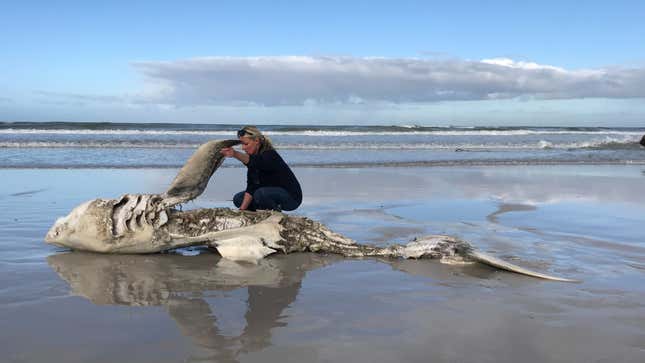
Two orcas named Port and Starboard seem to have developed a taste for great white sharks. Since 2017, eight great white sharks have washed ashore in South Africa, with signs of having been attacked by orcas. Seven of the sharks—typically apex predators—were missing their livers, and some didn’t have their hearts anymore.
The sharks’ wounds, as well as recorded sightings of the two orcas, indicated to a team of researchers that Port and Starboard were responsible for the killings, and they believe that more sharks were likely killed by the same pair but didn’t wash ashore. The findings are published in the African Journal of Marine Science.
“Killer whales are highly specialized hunters,” said Alison Towner, a marine biologist at the Dyer Island Conservation Trust and lead author of the new research, in an email to Gizmodo. “This specific type has learned how to target sharks for their lipid-rich, nutrient-dense liver, which can be up to one-third of the shark’s body weight.”

Full-grown orcas can be over 30 feet long and weigh over 7 tons, according to Whale and Dolphin Conservation. Orcas hunt in packs and eat a range of prey, including seals and dolphins, but also sharks and squids. But great white sharks are formidable opponents; the fish can be up to 20 feet long and have hundreds of pointy serrated teeth, perfect for tearing apart flesh. But in this case, the hunters became the hunted.
Using tagging and sighting data, Towner’s team determined that the great white sharks have stopped visiting certain regions along the South African coast where the orcas have been feeding on the subadult sharks. “The more the orcas frequent these sites, the longer the great white sharks stay away,” Towner said in a press release.
The orcas (nicknamed Port and Starboard by the team) are throwing the entire food chain for a loop. With the ordinarily apex great whites vacating the area, a new predator—the bronze whaler shark, which is known to be eaten by great whites—is emerging. But the orcas are going after those sharks, too.

The reduced presence of great whites has also increased local numbers of their prey, Cape fur seals, which are in turn eating the critically endangered African penguins. “To put it simply, although this is a hypothesis for now, there is only so much pressure an ecosystem can take, and the impacts of orcas removing sharks are likely far wider-reaching,” Towner said.
Tough as they are, great whites are a vulnerable species, according to the World Wildlife Fund. With Port and Starboard on their tails, these sharks have no choice but to abandon ship—er, habitat.
More: Great White Sharks May Have Pushed Megalodons to Extinction